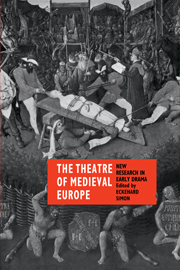Book contents
- Frontmatter
- Contents
- List of contributors
- Preface
- Note on the bibliography and system of references
- List of abbreviations for journals and series
- 1 Introduction: trends in international drama research
- PART I LATIN DRAMA
- PART II ENGLISH DRAMA
- PART III CONTINENTAL DRAMA
- Bibliography
- Author index to the bibliography
- General index
1 - Introduction: trends in international drama research
Published online by Cambridge University Press: 29 March 2011
- Frontmatter
- Contents
- List of contributors
- Preface
- Note on the bibliography and system of references
- List of abbreviations for journals and series
- 1 Introduction: trends in international drama research
- PART I LATIN DRAMA
- PART II ENGLISH DRAMA
- PART III CONTINENTAL DRAMA
- Bibliography
- Author index to the bibliography
- General index
Summary
Set the task of charting for this volume the most significant advances in the research work undertaken during the past twenty-five years relating to theatre in the Middle Ages, I regard it as advisable to start by trying to establish an historical framework against and within which to measure recent developments. It is thus without further apology that I shall retreat from the present and recent past deep into the nineteenth century in order to supply a raison d'être for regarding the past quarter-century as a period possessed of some significance of its own rather than as just an arbitrary, if convenient, time-span to validate the organising of this volume. Against the background of this introductory survey, covering landmarks of international interest in the dramatic literature and theatre practice of the Middle Ages from their demise late in the sixteenth century until the middle of the present century, I shall then proceed to examine four particular areas of study in which I believe major advances to have been made in previously accepted criteria for critical evaluation: records; performance; centres for research, colloquia and journals; and, finally, historical and critical analysis.
FACTS AND THEIR INTERPRETATION, 1700–1960s
As a start, it is useful to recall that, from the early years of the seventeenth century until near the end of the eighteenth, knowledge of medieval dramaturgy and its accompanying stagecraft slowly waned as interest in it, from both a scholarly and a practical viewpoint, crumbled everywhere in Europe under the weight of the advancing neo-classical Enlightenment.
- Type
- Chapter
- Information
- The Theatre of Medieval EuropeNew Research in Early Drama, pp. 1 - 18Publisher: Cambridge University PressPrint publication year: 1991



